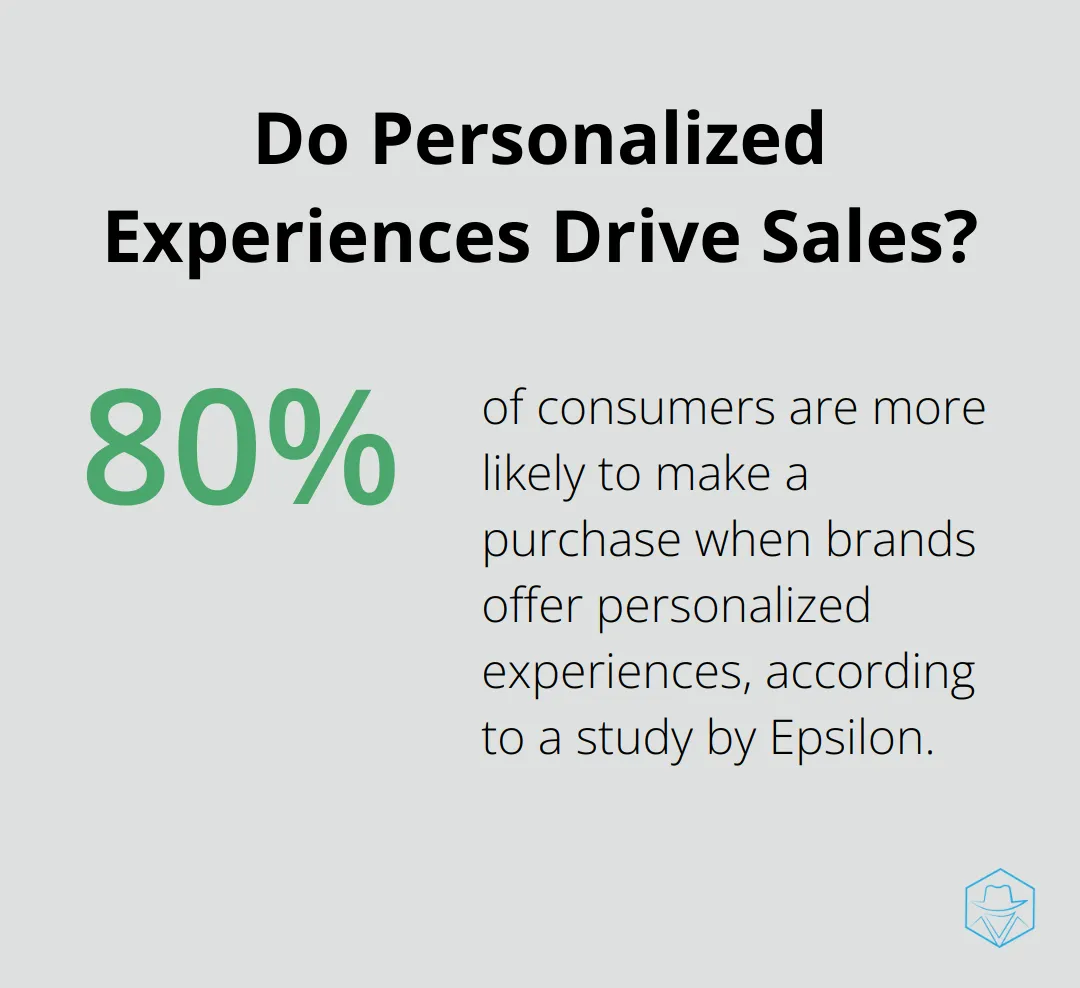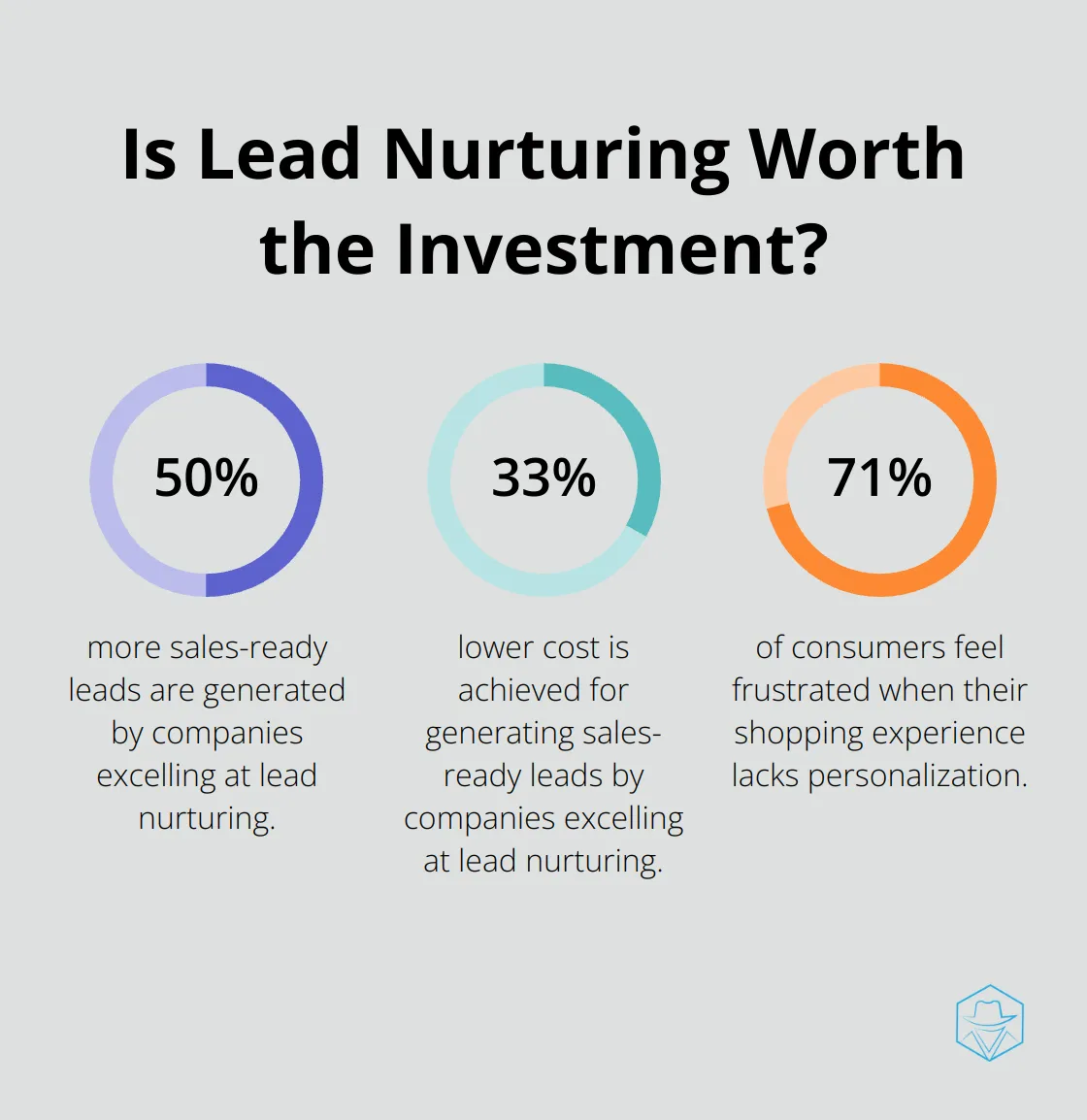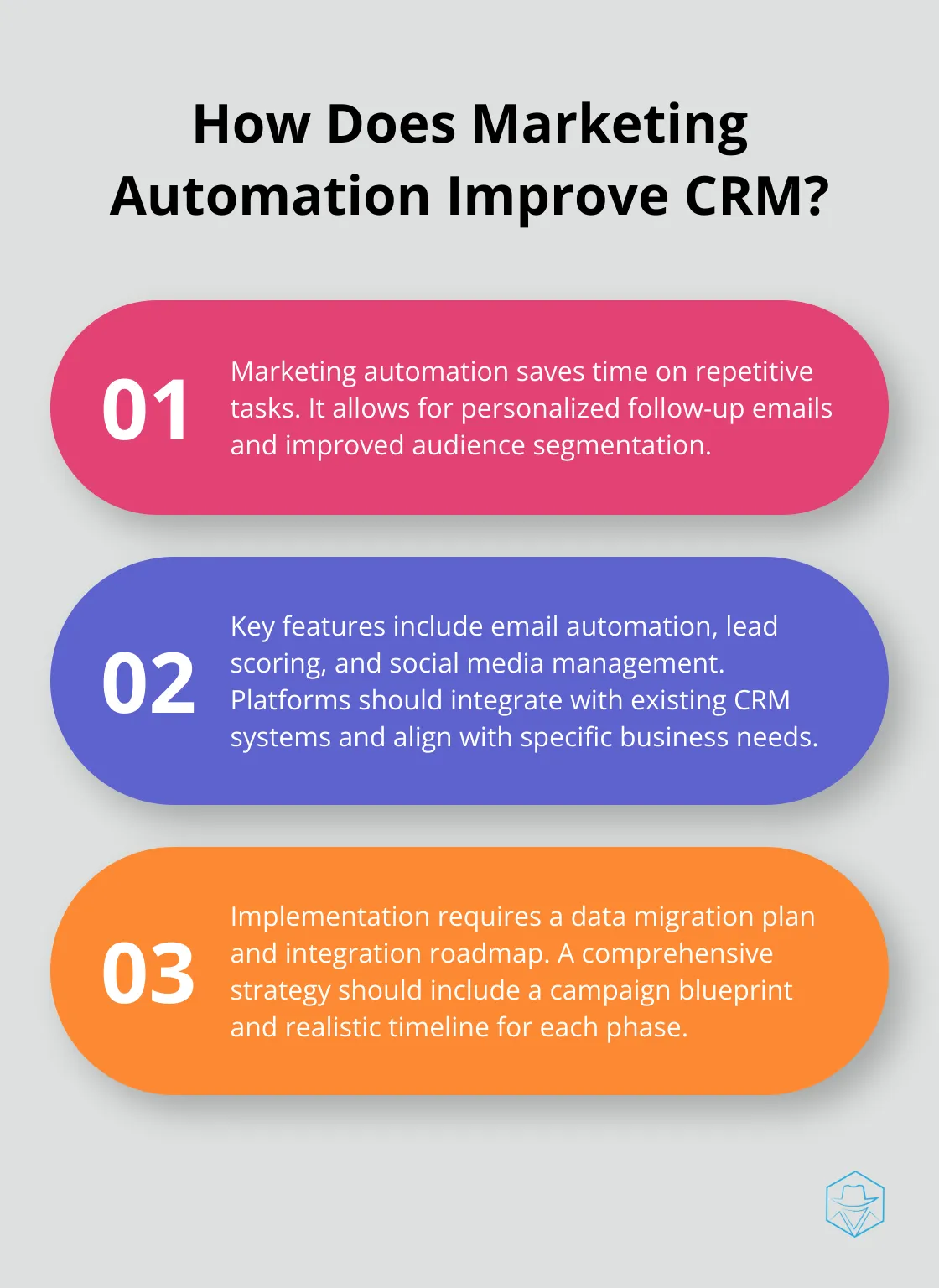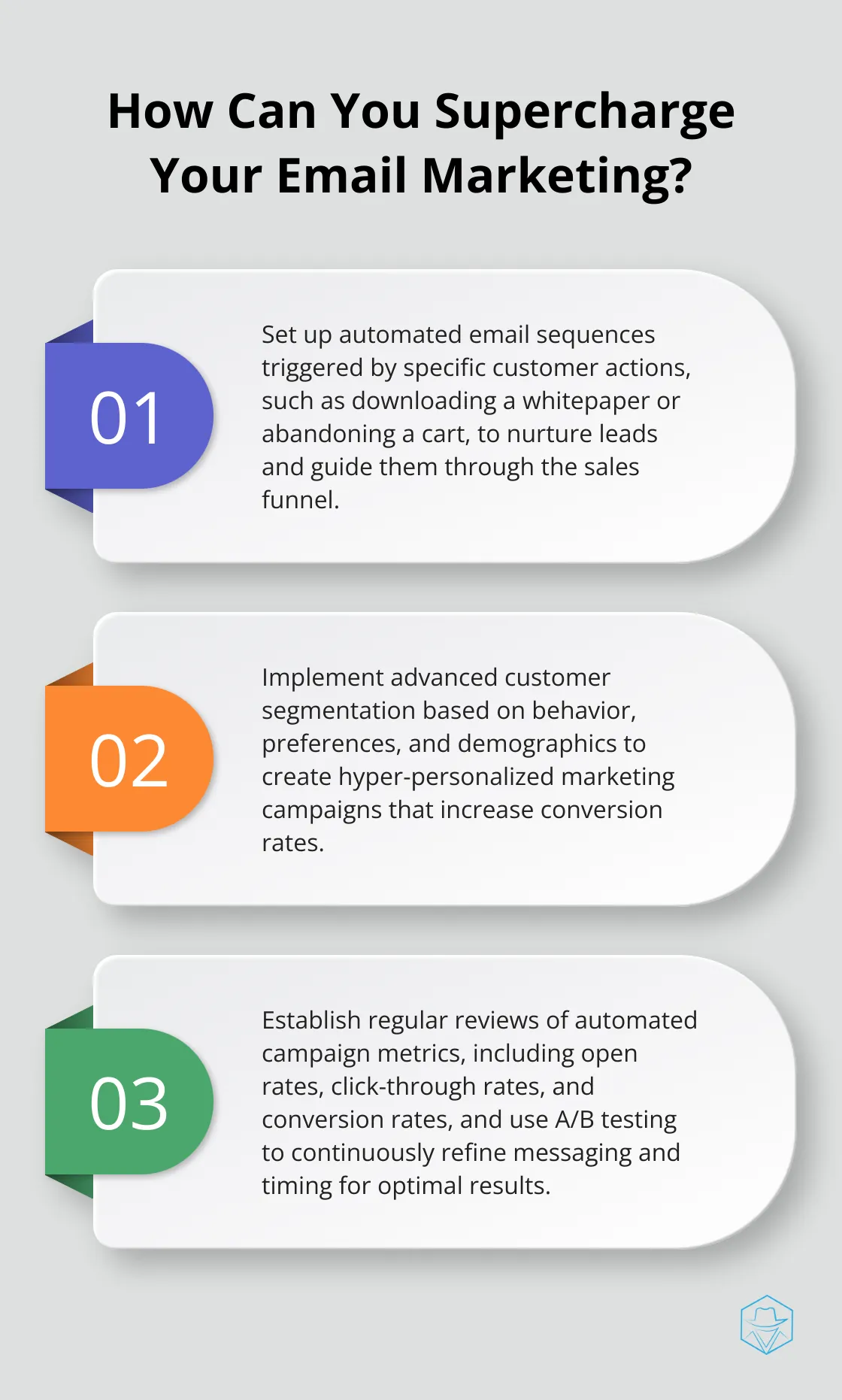Marketing Automation in CRM: Benefits and Implementation

At Drop Cowboy, we’ve seen firsthand how marketing automation in CRM can transform businesses. This powerful combination streamlines processes, enhances customer relationships, and drives growth.
In this post, we’ll explore the benefits of integrating marketing automation with your CRM system and provide practical steps for implementation. Get ready to supercharge your marketing efforts and achieve better results.
What Is Marketing Automation in CRM?
Marketing automation in CRM revolutionizes how businesses approach their marketing efforts and customer engagement. This powerful combination uses software to automate repetitive marketing tasks within your Customer Relationship Management system, creating a more efficient and effective marketing strategy.
The Building Blocks of Marketing Automation
Marketing automation encompasses various tools, including:
- Email marketing
- Social media posting
- Lead generation
- Customer segmentation
These components work in harmony to create a cohesive marketing strategy that maximizes efficiency and effectiveness. For example, Drop Cowboy’s Mimic AI™ technology personalizes voicemail messages at scale, allowing businesses to reach customers in a tailored way without the time-consuming process of individual message recording.
Seamless Integration with CRM
The integration of marketing automation and CRM creates a powerful synergy. Your CRM system houses valuable customer data, which marketing automation puts to work. This integration enables more targeted marketing campaigns based on customer behavior, preferences, and interactions with your business.

Consider this scenario: A customer shows interest in a specific product through their browsing history. An automated email campaign triggers, providing more information about that product. This level of personalization (which would be challenging to achieve manually) becomes effortless with marketing automation.
Breaking Away from Traditional Marketing
Marketing automation in CRM marks a significant shift from traditional marketing methods. While traditional marketing often relies on broad, one-size-fits-all approaches, marketing automation enables highly targeted, personalized campaigns.
A study by Epsilon found that 80% of consumers are more likely to make a purchase when brands offer personalized experiences. Marketing automation makes this level of personalization possible on a large scale.
Furthermore, marketing automation provides real-time data and analytics, allowing businesses to quickly adjust their strategies based on performance. This agility contrasts sharply with traditional marketing methods, which often rely on delayed feedback and manual analysis.
The Power of Data-Driven Decision Making
Marketing automation in CRM empowers businesses to make data-driven decisions. By tracking customer interactions, engagement rates, and conversion metrics, companies can identify what works and what doesn’t in their marketing efforts.
This data-centric approach (which is difficult to achieve with traditional marketing methods) allows for continuous optimization of marketing strategies. Businesses can test different approaches, analyze the results, and refine their tactics to maximize ROI.
As we explore the benefits of implementing marketing automation in your CRM system in the next section, you’ll see how this powerful combination can propel your business forward and transform your marketing efforts.
Why Marketing Automation in CRM Is a Game-Changer
Marketing automation integrated with CRM systems revolutionizes how businesses approach their marketing efforts. This powerful combination offers numerous benefits that can significantly impact your bottom line and streamline your operations.
Supercharging Lead Generation and Nurturing
Marketing automation in CRM takes lead generation and nurturing to new heights. A study by Forrester Research shows that companies which excel at lead nurturing generate 50% more sales-ready leads at 33% lower cost. Automated workflows create targeted campaigns that guide prospects through the sales funnel, delivering the right message at the right time.

For example, when a potential customer downloads a whitepaper from your website, an automated email sequence triggers. This sequence provides additional relevant content, gradually nurturing the lead until they’re ready for a sales conversation. This process (which would consume significant time if done manually) becomes effortless with marketing automation.
Precision Targeting Through Advanced Segmentation
One-size-fits-all marketing is obsolete. Marketing automation in CRM allows for sophisticated customer segmentation based on behavior, preferences, and demographics. This level of targeting leads to more personalized and effective marketing campaigns.
A report by Segment found that 71% of consumers feel frustrated when their shopping experience lacks personalization. Marketing automation addresses this by enabling hyper-personalized communications. An e-commerce business can automatically send product recommendations based on a customer’s browsing history or past purchases (significantly increasing the likelihood of conversion).
Boosting Productivity and ROI
Marketing automation in CRM improves marketing effectiveness and increases efficiency. A study by Nucleus Research revealed that marketing automation drives a 14.5% increase in sales productivity and a 12.2% reduction in marketing overhead.
These productivity gains result from automating repetitive tasks like email sends, social media posts, and lead scoring. This automation frees up your marketing team to focus on strategy and creative tasks that require human insight.
Moreover, the ability to track and measure every aspect of your marketing efforts leads to better ROI. You can easily identify which campaigns perform well and which need adjustment, allowing for data-driven decision-making and continuous optimization of your marketing spend.
Seamless Alignment of Sales and Marketing
Marketing automation in CRM bridges the gap between sales and marketing departments. It provides a unified platform where both teams can access customer data, track interactions, and collaborate on lead nurturing strategies. This alignment results in a more cohesive customer experience and improved conversion rates.
As we move forward to discuss the implementation of marketing automation in CRM, you’ll discover how to harness these benefits for your own business and create a more efficient, effective marketing strategy.
How to Implement Marketing Automation in CRM
Assess Your Current Marketing Processes
Before you implement marketing automation, conduct a thorough assessment of your existing marketing processes. Identify repetitive tasks, bottlenecks, and areas that lack personalization. This evaluation will highlight where marketing automation can make the most significant impact.

For example, if you spend hours manually sending follow-up emails, automation can save you time. If you struggle with audience segmentation, look for a platform with robust segmentation capabilities.
Select the Right Platform
Choosing the appropriate marketing automation platform is essential. Look for a solution that integrates seamlessly with your existing CRM and offers the features you need most.
Key features to consider include:
- Email marketing automation
- Lead scoring and nurturing
- Social media management
- Analytics and reporting
- Personalization capabilities
Don’t just select the platform with the most features. Instead, choose one that aligns with your specific needs and goals. For instance, if voice messaging is a key part of your strategy, a platform like Drop Cowboy (with its Mimic AI™ technology for personalized voicemail messages) could be an excellent fit.
Develop a Comprehensive Implementation Strategy
After you choose your platform, create a detailed implementation strategy. This should include:
- Data migration plan: Ensure accurate transfer of all customer data to the new system.
- Integration roadmap: Plan how your marketing automation will integrate with other tools and processes.
- Campaign blueprint: Outline the automated campaigns you’ll set up first.
- Timeline: Set realistic deadlines for each implementation phase.
Train Your Team and Establish Best Practices
The success of your marketing automation efforts depends on your team’s ability to use the new system effectively. Invest in thorough training for all users (including marketing, sales, and customer service personnel who will interact with the system).
Establish best practices for using the platform. This might include guidelines for creating and testing automated campaigns, protocols for lead scoring, or rules for data entry to ensure consistency.
Monitor, Analyze, and Optimize Your Efforts
Implementation marks the beginning of your journey. The real power of marketing automation lies in its ability to provide insights that help you continuously improve your marketing efforts.
Set up regular reviews of your automated campaigns. Examine metrics like open rates, click-through rates, and conversion rates. Use A/B testing to refine your messaging and timing.
You might discover that emails sent on Tuesday mornings get higher open rates, or that leads who engage with your social media content convert more often. Use these insights to fine-tune your automation rules and improve your results over time.
Marketing automation requires ongoing attention and optimization to deliver the best results. However, with the right approach, it can transform your marketing efforts and drive significant growth for your business.
Final Thoughts
Marketing automation in CRM has become an essential tool for businesses to streamline their marketing efforts and drive growth. This powerful combination creates highly personalized, data-driven campaigns that resonate with audiences and deliver measurable results. As we look to the future, we expect to see more advanced AI and machine learning capabilities integrated into marketing automation platforms, enabling even more sophisticated personalization and predictive analytics.

The integration of voice and conversational AI into marketing automation strategies represents an emerging trend. Drop Cowboy stands at the forefront of this trend with our Mimic AI™ technology, which allows businesses to create personalized voicemail messages at scale. This technology exemplifies how marketing automation evolves to incorporate more channels and touchpoints in the customer journey.
Success with marketing automation doesn’t happen overnight. We recommend you start small, focus on your key objectives, and gradually expand your automation efforts as you gain experience and insights. Marketing automation in CRM is not just about technology-it creates more meaningful, personalized interactions with your customers. The future of marketing is automated, personalized, and data-driven-your business should embrace it now.
blog-dropcowboy-com
Related posts

March 18, 2025
Top Twilio Competitors in the Communications API Market
Explore top Twilio competitors in the communications API market. Compare features and find the best alternatives to enhance your communication strategy.

March 20, 2025
CRM Marketing Automation: Streamline Your Campaigns
Streamline campaigns with CRM marketing automation. Boost productivity and drive growth through efficient, targeted marketing strategies.

March 6, 2025
Text Message Marketing Statistics You Should Know
Explore text message marketing statistics to boost engagement and conversion rates effectively. Learn how SMS drives customer interaction.

March 21, 2025
AI in Marketing Automation: Transforming Customer Engagement
Explore how AI in marketing automation is reshaping customer engagement by boosting personalization, efficiency, and driving growth rapidly.

March 2, 2025
Inspiring Marketing Text Messages to Boost Engagement
Boost engagement with marketing text messages examples that captivate and inspire. Discover effective strategies to enhance your marketing communication.

March 26, 2025
HubSpot vs Marketo: Top Marketing Automation Tools
Compare HubSpot vs Marketo to find the ideal marketing automation tool for your business. Discover which software best suits your needs and strategies.